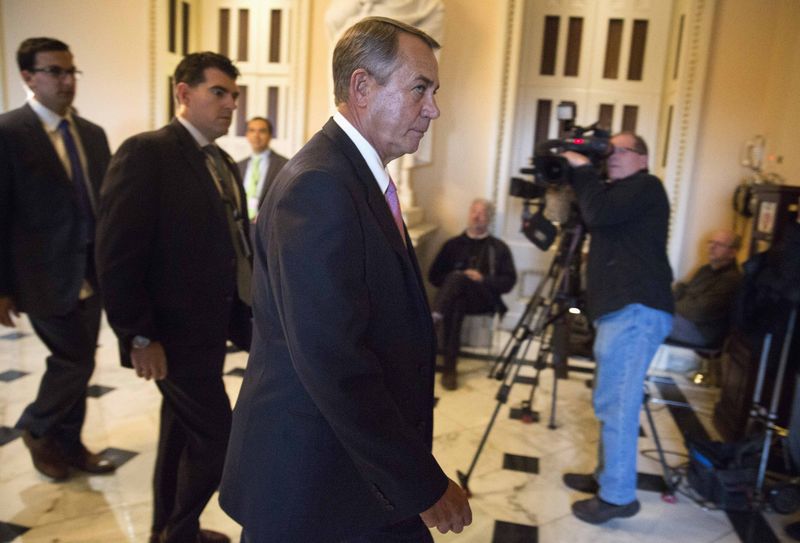By David Lawder and Richard Cowan
WASHINGTON (Reuters) - A chaotic three-month-long fight in Congress over funding the U.S. domestic security agency ended on Tuesday, but not before it highlighted House Speaker John Boehner's inability to halt the Republican Party's further descent into disorder.
The House of Representatives approved full fiscal-year funding for the Department of Homeland Security, after attempts by conservative Republicans to make funding contingent on blocking actions on immigration last November by Democratic President Barack Obama in which he bypassed Congress.
The final bill passed by the House in a 257-167 vote was a Senate measure stripped of language attacking Obama's orders, which lifted the threat of deportation for millions of undocumented residents.
The vote ended a fight that brought the DHS within hours of a partial shutdown last week and raised new questions about Boehner's leadership.
Obama said on Tuesday night he would sign the funding bill "as soon as I receive it," and added in a statement: "Today, after far too long, Congress finally voted to fully fund" the agency.
The department was formed after the Sept. 11, 2001, attacks to spearhead domestic counterterrorism efforts. Spending authority for the department had been scheduled to end at midnight on Friday.
Despite committing to drama-free government after November's elections, when Republicans won Senate control and tightened their grip on the House, they quarrelled internally in the struggle over the agency's funding and, in the end, achieved little.
By Tuesday, weeks of drama had left Boehner with few, if any, viable procedural options to keep the agency open while also placating conservatives who wanted the funding bill to block Obama's executive actions.
WEEKS LOST
The intra-party squabbling consumed weeks of lawmakers' time, casting doubt on promises from Boehner and Senate Majority Leader Mitch McConnell that the new Republican-led Congress could overcome its divisions to challenge Obama and forge significant legislative accomplishments.
In the end, 75 Republican House members joined 182 Democrats to end the impasse and approve the Senate funding bill.
Senate Democrats had repeatedly blocked a separate House-passed bill that had included the restrictions on Obama's immigration orders, while Obama and the Democrats had backed the "clean" funding bill passed by the Senate.
In the final minutes before the House vote, Representative Charlie Dent, a moderate Pennsylvania Republican, said during floor debate: "It's time to move forward and stop playing these silly games. ... Let's prove to the American people that we're serious about protecting this homeland and that we have the capacity to govern."
Several Republicans said they would be better served by putting their energy into legal strategies to overturn Obama's immigration actions, which have been put on hold by the courts.
"This is where we must focus our actions," said Republican Representative Mike Simpson of Idaho.
A U.S. appeals court in Washington said it would hear oral arguments on May 4 in one challenge to Obama's executive actions. A federal judge in December threw out a lawsuit brought by Arizona sheriff Joe Arpaio, who called the changes unconstitutional. Arpaio appealed the ruling.
CAPITULATION?
Still, some conservatives said the House was making a mistake by capitulating on the immigration battle.
"This is a very, very sad day," said Republican Representative Matt Salmon of Arizona. "If we're not going to fight now, when are we going to fight?"
The White House was pleased that Republican leaders in the House "abandoned the search for political advantage and are instead just trying to move forward to do the right thing," spokesman Josh Earnest said.
On Friday, the House rejected a three-week funding extension and voted to keep the lights on at Homeland Security for one week, seeking more time to battle Obama. But Boehner told Republican House members on Tuesday that it was time to allow a vote on the provision-free Senate bill.
"The speaker made the case that he had hoped to continue to fight for three more weeks. Obviously we didn't win that vote last week, so we are where we are," said Representative Luke Messer of Indiana, who chairs the Republican Policy Committee.
"It's disappointing. I had hoped we'd be able to continue to fight," he said.
Boehner allowed the use of a procedural motion to bring up the Senate's funding bill, which passed the House with support from both moderate Republicans and House Democrats.
The bill provides nearly $40 billion in funding for the agency, which secures U.S. borders, airports, coastal waters and other critical facilities. Without the funding, the agency would have been forced to furlough about 30,000 employees, or about 15 percent of its workforce. About 200,000 others would have stayed on the job without pay, including airport and border agents.
Boehner suffered an embarrassing setback last week when conservatives rebelled against his plan for a three-week extension, but some said they did not think his ultimate failure on the issue would threaten his leadership.

"I think anybody who's been watching this knew this is where we were going to end up back in December," said Representative Thomas Massie, a conservative Republican from Kentucky.